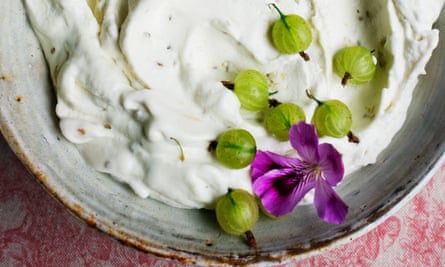
I had cooked aubergines in a pan on the hob, letting them soak up as much olive oil as they liked, then seasoned them with mustard seeds and cumin, grated ginger and ground turmeric. I stirred in a couple of chopped tomatoes and handful of mint leaves to give a soft, squashy sauté that I could serve chilled as a salad or hot from the pan with cardamom and lemon rice.
Instead, I decided to wrap the fragrant mixture in pastry, light as a feather, and put it on the table with a dip: an emerald yoghurt sauce with coriander and mint. The filling could have been wrapped like a ravioli or dumpling, or one of those little pastry twists like an Elizabethan purse. The point was to add a light, crunchy contrast to the silky, spicy filling.
I made a frozen yoghurt, too, in a (successful) attempt to cool our palettes after the chilli spiced dumplings. The last of the season’s gooseberries gave the ice a refreshing kick.
Aubergine filo dumplings with coriander and chutney
You only need a couple of sheets of filo for this. The rest can be returned to the freezer. You can also make the dumplings in advance and keep them overnight in the fridge, on their parchment-lined baking sheet, then bake them just before eating. Makes 16, enough for 4
aubergines 2, medium to large
sunflower or vegetable oil 8 tbsp
onion 1, medium to large
garlic 3 cloves
cumin seeds 2 tsp
yellow mustard seeds 1 tsp
tomato purée 2 level tbsp
ginger 45g
ground turmeric 1 tsp
red chilli 1, medium hot
tomatoes 2, medium
mint leaves 3 tbsp, chopped
filo pastry 2 sheets
olive or sunflower oil a little
Peel the aubergines, cut them in half lengthways, then in half again and into 2cm cubes. Warm the oil in a shallow- sided pan, then lightly brown the aubergines, turning them with kitchen tongs or a spoon to lightly colour all sides.
Peel and roughly chop the onion. Remove the aubergines from the pan and put them in a mixing bowl. Add the onion to the pan and let it cook for 7-10 minutes over a low to moderate heat until soft and translucent. While the onions are cooking, peel and thinly slice the garlic, then add to the pan with the cumin and mustard seeds, tomato purée and a grinding of salt and black pepper.
Peel and grate the ginger, then stir into the onions, with the ground turmeric. Halve, deseed and finely chop the chilli. Roughly chop the tomatoes, add them to the pan and continue cooking for 5 minutes, then stir in the mint leaves and remove from the heat. Leave to cool.
Preheat the oven to 200C/gas mark 6. Place a sheet of filo pastry, long side towards you, on a pastry board or work surface. Cut into 2 pieces lengthways to give 2 long, thin strips of pastry, then cut each of those into 4 squares. Working on a square at a time, place 1 heaped tbsp of mixture on each square.
Brush the edges of each pastry square with a little water, then gather all 4 edges together into a point to form a pyramid and press dampened edges tightly together to seal. (If you don’t press them firmly together, they will unfold as they bake.) You can either press each edge together or scrunch and twist the corners together to seal, whichever you find easiest. As you complete each parcel, place on the lined baking sheet.
Brush the parcels lightly with oil then bake for 7 minutes until crisp and golden. Eat immediately with the coriander chutney below .
For the chutney:
coriander 20g
mint leaves 15g
lime 1
yoghurt 4 tbsp
Pull the leaves from the coriander and mint stalks and chop finely. Use a food processor if you wish. Halve and squeeze the lime into the herbs then stir in the yoghurt and 1-2 tbsp of iced water. Keep chilled until ready to use.
Gooseberry and goat’s milk ice
Goat’s milk yoghurt is light and less creamy, which is ideal for this ice, but you can, of course, use any natural yoghurt you wish. Serves 6
gooseberries 500g
honey 5 tbsp
elderflower cordial 3 tbsp
goat’s milk yoghurt 400g (or cow’s if you like)
Remove the stalks and dried flowers from the gooseberries. Put the fruit into a stainless-steel saucepan (acid fruits react badly with aluminium), then add the honey and elderflower cordial. Bring to the boil, then lower the heat and cook for 5-10 minutes until the fruit has turned opaque and the berries have started to burst.
Crush the berries with a fork to give a rough purée, then chill thoroughly. You can speed this process up by transferring the purée to a bowl and cooling over a bowl of ice cubes.
Stir the yoghurt into the cold gooseberry mixture, then churn until almost frozen and transfer to a freezer box. Or, to make it without an ice-cream churn, pour the mixture into a freezer box, cover with a lid and freeze for 2 hours or until ice crystals have started to form around the edges. Stir them into the liquid centre of the mixture and return to the freezer. (Mixing with a balloon whisk at this point will make your ice extra creamy in texture.) Return to the freezer and freeze for another hour or so, again whisking the frozen crystals into the middle. Do this until the mixture is almost frozen. The ice will eventually freeze completely. Remove from the freezer for 20 minutes beforehand to soften slightly before serving.
Follow Nigel on Instagram @NigelSlater



